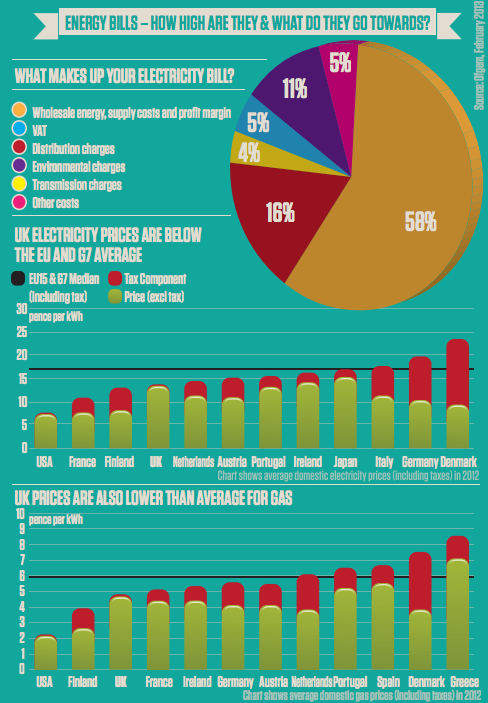Q and A: What determines our gas and electricity bills?

Q My electricity bills seem pretty steep. Are they higher in the UK than elsewhere?
A In short – not really. Compared to the 15 countries that made up the European Union prior to the 2004 accession (known as the EU15), the UK had the fourth lowest prices in 2012 – when including taxes that each state imposes. Average domestic UK prices were 14.2 per cent lower than a median average across EU15 and G7 countries.
Q What about gas prices then, are they also lower than in other countries?
A Relatively, gas prices are even better for Brits, coming in second lowest in the EU15 last year – and 22.1 per cent below the median average across EU15 and G7 countries.
Q But hold on – you mentioned taxes. How do they affect these figures?
A The tax component added to domestic electricity and gas bills is low in the UK compared to other countries. Excluding all countries’ taxes, UK gas prices were only 1.1 per cent lower than the EU15 and G7 median last year. And electricity prices, excluding taxes, were the fourth highest in the EU15 last year.
Q So if tax rates were the same, would we be getting ripped off?
A Not necessarily. It’s hard to tell how prices would compare if tax rates were harmonised as underlying prices are partly influenced by how much tax is imposed. For example, on a pack of 20 cigarettes that costs £8, around £6.20 can be made up of taxes. But if there were no taxes, it is very unlikely that the same pack would only cost £1.80. In countries with higher rates of tax on energy, therefore, lower taxes would not necessarily see prices fall all the way down to the level one may expect.
Q I’ve heard about the feather/rocket claim – do utilities send our bills rocketing when wholesale prices rise, but then only lower them slowly when wholesale costs fall?
A Perhaps – this one is still open to debate. An Ofgem report in 2011 claimed there was “some evidence that customer energy bills respond more rapidly to rising supplier costs compared with falling costs” yet said the range of possible reasons meant that “the implication for consumer harm is not clear cut.”
Q I hear you, but sometimes my bills just shoot up. I have the copies to prove it!
So why does this happen?
A While energy costs in the UK, including taxes, are fairly low, they can be more volatile than in many peer countries. For example, in fiscal year 2010-11 UK electricity prices jumped 11.2 per cent – excluding taxes. This was among the highest price hikes in the EU, excepting Spain where prices rose nearly 14 per cent.
Q So they’re getting more expensive? Is this why Ed Miliband’s speaking up now?
A Well they haven’t been getting more expensive if you look over several years. In the 10 years to 2012, UK electricity prices went from 7.09p per kilowatt hour (kWh) to 13.9p per kWh. The EU15 and G7 median went from 8.6p/kWh to 16.2p/kWh. UK prices may be more affected by wholesale costs, but those can drop as well as rise.
Q Apart from wholesale costs, what else can make my bills go up?
A Green measures rolled out by the government – investing in lower-carbon production comes at a cost. Ofgem says that 11 per cent of an average electricity bill last December was accounted for by environmental charges, while the figure was six per cent for gas bills. Npower says £75 of an annual energy bill in 2007 was due to state policy and regulation, rising to £185 this year, and £329 by 2020.
Q What about profiteering? Is there enough competition to keep prices down?
A Another debatable one, this. “Right now the UK energy market is one of the most liberal and competitive globally,” said Brewin Dolphin analyst Nik Stanojevic yesterday. Many disagree, but one thing to consider – without profits, there’s little chance of the investment that the UK needs.
- Labour wipes billions off energy firms as price freeze predicted to cost £6.8bn
- Mandelson says Miliband taking party backwards
- We can bring down UK energy costs without Miliband’s populist price fix
- Freedom and liberty: The dangerous words our politicians ignore